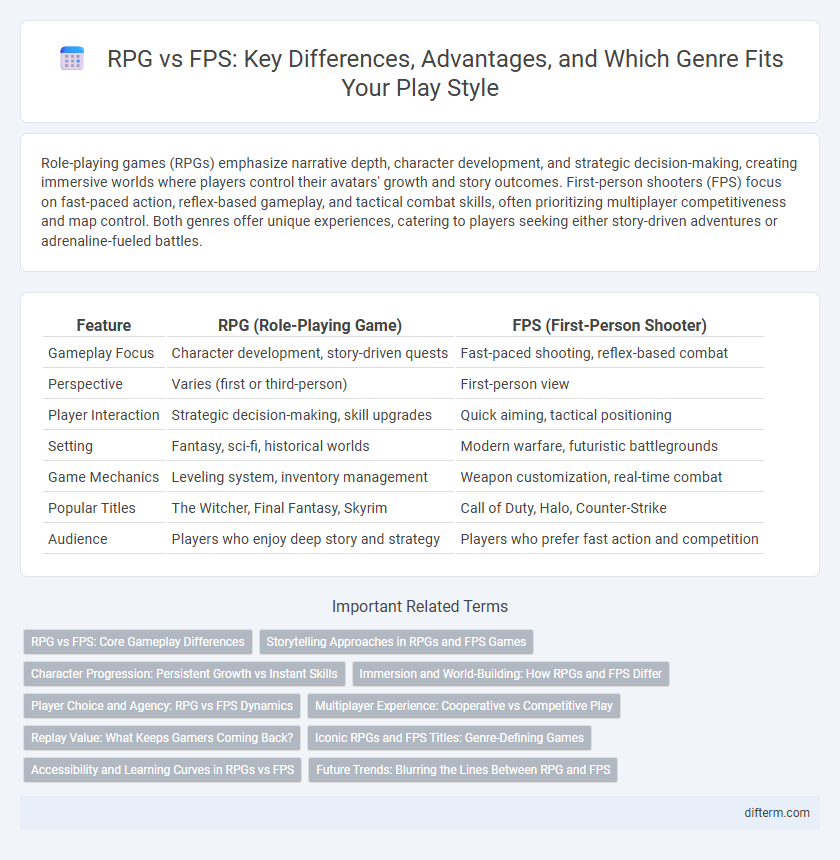Role-playing games (RPGs) emphasize narrative depth, character development, and strategic decision-making, creating immersive worlds where players control their avatars' growth and story outcomes. First-person shooters (FPS) focus on fast-paced action, reflex-based gameplay, and tactical combat skills, often prioritizing multiplayer competitiveness and map control. Both genres offer unique experiences, catering to players seeking either story-driven adventures or adrenaline-fueled battles.
Table of Comparison
| Feature | RPG (Role-Playing Game) | FPS (First-Person Shooter) |
|---|---|---|
| Gameplay Focus | Character development, story-driven quests | Fast-paced shooting, reflex-based combat |
| Perspective | Varies (first or third-person) | First-person view |
| Player Interaction | Strategic decision-making, skill upgrades | Quick aiming, tactical positioning |
| Setting | Fantasy, sci-fi, historical worlds | Modern warfare, futuristic battlegrounds |
| Game Mechanics | Leveling system, inventory management | Weapon customization, real-time combat |
| Popular Titles | The Witcher, Final Fantasy, Skyrim | Call of Duty, Halo, Counter-Strike |
| Audience | Players who enjoy deep story and strategy | Players who prefer fast action and competition |
RPG vs FPS: Core Gameplay Differences
RPGs focus on character development, story progression, and strategic decision-making, emphasizing exploration and narrative depth. FPS games prioritize fast-paced, skill-based shooting mechanics, with an emphasis on reflexes and spatial awareness in multiplayer or single-player modes. Core gameplay in RPGs revolves around quests and customization, whereas FPS centers on precision aiming and real-time combat.
Storytelling Approaches in RPGs and FPS Games
RPGs prioritize immersive storytelling through character development, branching narratives, and player choices that directly impact the game world, fostering deeper emotional engagement. FPS games typically emphasize fast-paced action with minimal narrative, focusing on immediate gameplay mechanics rather than complex story arcs. The divergent storytelling approaches reflect RPGs' commitment to narrative depth and FPS games' focus on kinetic gameplay experience.
Character Progression: Persistent Growth vs Instant Skills
RPGs emphasize character progression through persistent growth, allowing players to develop skills, abilities, and attributes over time, creating a unique and evolving experience. In contrast, FPS games focus on instant skills, requiring quick reflexes and mastery of weapons without significant character development. This fundamental difference shapes gameplay, with RPGs rewarding long-term strategy and customization, while FPS games prioritize fast-paced, immediate action.
Immersion and World-Building: How RPGs and FPS Differ
Role-playing games (RPGs) excel in immersion and world-building by offering expansive narratives, deep character development, and intricate lore that engage players on a personal and emotional level. First-person shooters (FPS), while often prioritizing fast-paced action and competitive gameplay, provide immersive experiences through realistic environments, dynamic sound design, and intense first-person perspectives that heighten tension. The key distinction lies in RPGs fostering player-driven storytelling within detailed virtual worlds, whereas FPS games emphasize immediate, sensory immersion through gameplay mechanics and visual realism.
Player Choice and Agency: RPG vs FPS Dynamics
RPGs (Role-Playing Games) emphasize player choice and agency through branching narratives, character customization, and moral decision-making, allowing players to shape story outcomes and gameplay style. FPS (First-Person Shooters) focus more on reflexive action and tactical skill, with player agency largely tied to weapon selection, map strategy, and real-time combat decisions. The dynamic tension between narrative freedom in RPGs and skill-based engagement in FPS games highlights differing approaches to defining player control and interactivity within gaming experiences.
Multiplayer Experience: Cooperative vs Competitive Play
RPGs often emphasize cooperative multiplayer experiences where players team up to complete quests and develop characters, fostering teamwork and strategy. FPS games largely prioritize competitive multiplayer modes, pitting players against each other in fast-paced, skill-based combat scenarios that demand quick reflexes and tactical decision-making. These contrasting multiplayer dynamics cater to different player preferences, with RPGs promoting collaboration and story-driven interaction, while FPS games offer intense, competitive engagement.
Replay Value: What Keeps Gamers Coming Back?
RPGs offer high replay value through expansive storylines, character customization, and multiple branching endings that encourage diverse playstyles. FPS games maintain player engagement with fast-paced multiplayer modes, competitive leaderboards, and frequent content updates that enhance tactical gameplay. Both genres leverage unique mechanics to sustain long-term player interest and community interaction.
Iconic RPGs and FPS Titles: Genre-Defining Games
Iconic RPGs like The Elder Scrolls V: Skyrim and Final Fantasy VII revolutionized narrative depth and character customization, setting benchmarks for immersive storytelling and expansive worlds. FPS titles such as DOOM and Call of Duty defined fast-paced, precision shooting mechanics, popularizing multiplayer modes and realistic combat simulation. Both genres continue to influence game design, shaping player expectations with their unique approaches to gameplay and engagement.
Accessibility and Learning Curves in RPGs vs FPS
RPGs often feature intricate storylines and character progression systems that require players to invest time in understanding mechanics, resulting in a steeper learning curve compared to FPS games. FPS titles typically offer more immediate and intuitive gameplay with straightforward controls, making them accessible to newcomers seeking fast-paced action. Accessibility in RPGs can be limited by complex menus and strategic decision-making, while FPS games prioritize reflexes and spatial awareness, appealing to a broader audience looking for quick engagement.
Future Trends: Blurring the Lines Between RPG and FPS
Future trends in gaming indicate an increasing convergence between RPG and FPS genres, driven by advancements in AI-driven storytelling and immersive gameplay mechanics. Hybrid games now incorporate deep character development and narrative choices typical of RPGs within the fast-paced, real-time combat environments of FPS titles. This blend enhances player engagement by combining strategic decision-making with intense action, paving the way for innovative multiplayer experiences and cross-genre appeal.
RPG vs FPS Infographic

 difterm.com
difterm.com